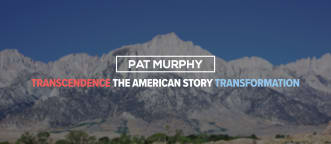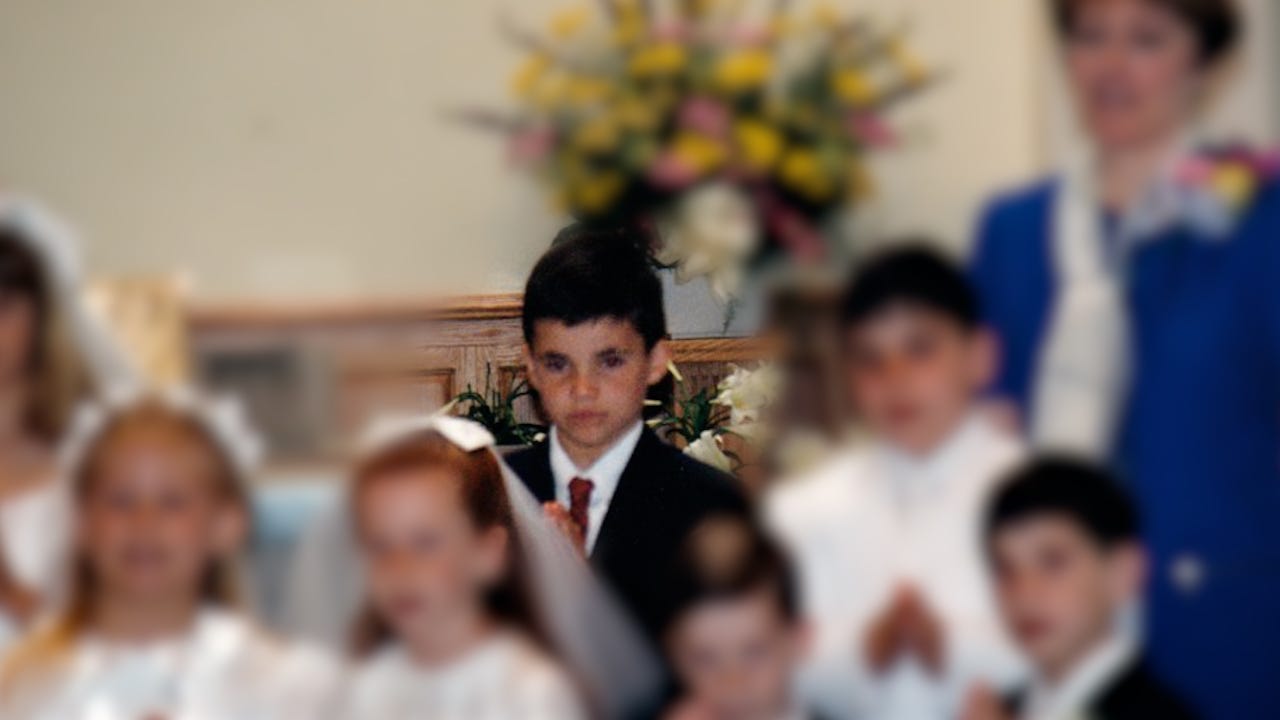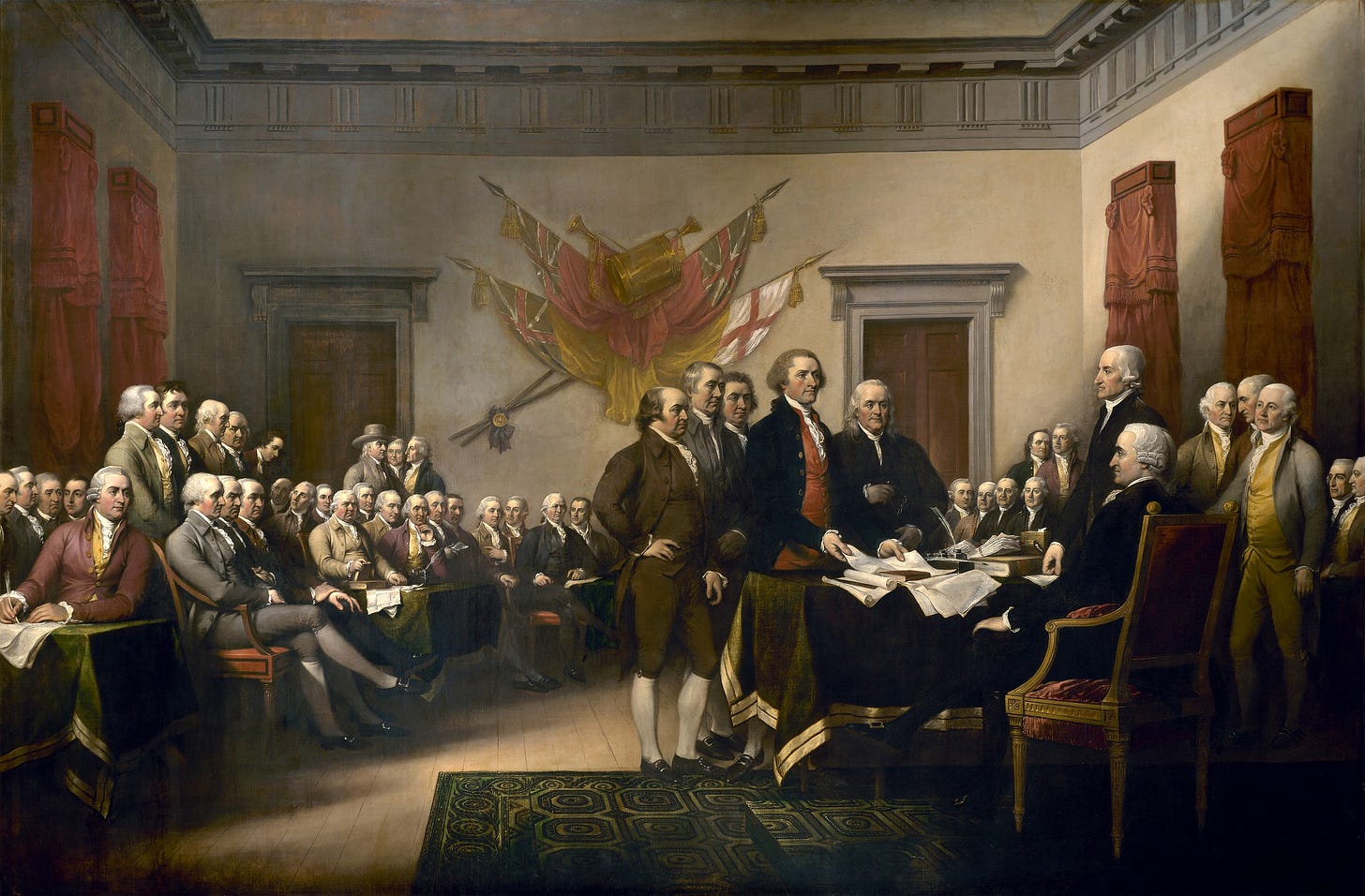Why We Need an American Mythology
Chaos reigns in the vacuum of shared beliefs
I. The Problem with Religion
“Religion,” wrote the Roman philosopher Seneca, “is regarded by the common people as true, by the wise as false, and by the rulers as useful.” I used to regard that utility aspect of religion as entirely sinister. But now in its absence, I understand how crucial it is.
I was raised, albeit gently, in the Catholic Church. This included CCD (Confraternity of Christian Doctrine) every week and mass on Sundays. Catholic mass is a rather odd affair. There’s an awful lot of alternating between sitting and standing. Adults mumble through hymns while white-haired, cloaked officials wave around incense and a basket for cash donations. I participated in the first four sacraments: Baptism, 1st Communion, Confession, and Confirmation.
As a child, I distinctly remember believing in an all-knowing, all-powerful, benevolent force looking over me. I prayed to him at night before bed. Suspicion began to creep in when he did not respond to my calls to get a good grade on the next day’s math test, or whatever great challenge was presented to my adolescent existence.
George Carlin once joked that he too was Catholic, “until he reached the age of reason.” For me, that age was around 14 years old. These were the golden years of the atheism movement, and I devoured books by Richard Dawkins, Christopher Hitchens, and Sam Harris.
I wrote articles for my high school newspaper about the evil of religion and the urgent need to get rid of it. New information on the sexual abuses of the clergy were coming to light, as well as the Church’s efforts to cover it up.
It was also a time when I began learning European history, and the horrific legacy of the Church through the Inquisition, indulgences, and the repression of scientific discovery. It seemed obvious that religion was an evil force, rooted in ignorance, used by the establishment to solidify power, and that the road towards progress required doing away with these antiquated belief systems.
How naive I was.
II. Belief is What it Means to be Human
What the atheism movement did not account for is the vacuum left in the absence of these belief systems, however flawed they are.
In his book Sapiens, historian Yuval Noah Harari demonstrates the vital role that belief plays in the very foundation of what it means to be human. What separates Homo sapiens from the rest of the natural world is our ability to create and believe in fictional stories. No other species does this, and it explains how we conquered the natural environment in record evolutionary speed.
It was all about mass cooperation. A single human being in the jungle is a pretty ineffective creature. One-on-one and without tools, we’re no match against almost any animal. When we co-existed with other human species like the Neanderthals, they were much stronger in terms of physical strength. Where Homo sapiens excelled was cooperating in large numbers; through large scale hunting techniques, working together as a tribe, and developing tools.
Later, in order to build civilizations and nations, we needed to invent and then believe in utterly fictional concepts: gods, money, the law, art, kings, democracy, human rights. These are merely stories, and yet the functioning of our civilization depends on our collective belief in them.
This “mythical glue,” writes Harari, is the real difference between us and chimpanzees and “has made us the masters of creation.” He notes that when observing interactions in groups of human beings versus chimpanzees, there’s surprisingly little difference when that number is under 150. Once it passes that threshold, the differences become significant. And once it passes one or two thousand, the differences are enormous.
Take for example the modern company. In order to create cohesion among thousands of employees scattered around the world, you need to create a brand. A story about what the company is. There is design, mission statements, guiding principles, and leadership. Steve Jobs understood this ingeniously and created the alluring fictional story of Apple.
This is modern, mass cooperation. And we need it to survive.
III. A Civil, Holy War
The United States of America was founded on a fictional story, born out of the Enlightenment; That all men are created equal, endowed by their creator with certain unalienable rights, that among these are life, liberty, and the pursuit of happiness. This was the founding mythology of our country, and as the centuries wore on, a new mythology was introduced: The American Dream. The idea was that America was a refuge for people all over the world to start a new life and make something of themselves.
Of course, the founding myths of America were flawed. The authors were slaveowners, and those descendants were deliberately left out of the American Dream through Jim Crow laws, segregation, and red lining. The settlers engaged in genocide of the Indigenous people from the moment they stepped foot in Jamestown. Whether or not to acknowledge this part of our history, and how to deal with it in the present, is one of the most contentious aspects of the culture war.
But it’s not the only aspect. Less discussed is the widening wealth gap and those left behind by neoliberal ideas and globalization. Home ownership, one of the classic pillars of the American Dream, is out of reach for many. Higher education is increasingly looking more and more like a scam. It’s becoming harder and harder to believe in a system that is increasingly rigged against the common folk, whether that’s a Trump voter in an Ohio diner or a debt-ridden college graduate espousing Marxism.
When a shared belief system is broken down, the human need to believe remains and people become vulnerable to all sorts of bad ideas. The ideology of the far left seeks to remedy historical injustices through tactics that resemble the religions of old. There’s an unquestionable orthodoxy, a sanctimonious way of being, and a casting out of non-believers by whatever means necessary. The far right feels that their traditional beliefs systems are under attack, and they’re willing to enforce those values through militias, kidnappings, and physical violence.
Many of our institutions are complicit in, and feed off, this chaos: universities, tech companies, legacy media, and Congress. This extremism has infested the public discourse with so much vitriol that we are no longer able to communicate with one another. Many Americans now view the other side as an existential threat to the nation. Nothing is sacred amongst the fervor of these ideologues: A statue of Abraham Lincoln lies graffitied and toppled in Portland, Oregon while the nation’s capital is raided and desecrated by an angry mob.
We are witnessing the vacuum created by the breakdown of shared beliefs. While mythology can lead to dangerous and ignorant behavior, it is crucial to the cohesion of a nation. As Abraham Lincoln prophetically stated in 1838:
“All the armies of Europe, Asia and Africa combined, with all the treasure of the earth… could not by force, take a drink from the Ohio, or make a track on the Blue Ridge, in a trial of a thousand years… As a nation of freemen, we must live through all time, or die by suicide.”
The new Civil War has nothing to do with geography. It’s more of a religious war. A war between deeply entrenched belief systems. Tech entrepreneur Balaji Srinivasan has compared the difference between red and blue America to that of Sunni and Shiite Muslims. It’s becoming unthinkable to marry somebody from the other side. Florida and Oregon could become governed under entirely different understandings of what America is.
A New Mythology
I used to make fun of the Catholic Church, and of believers in general.
What I didn’t understand is how it created a sense of purpose, meaning, and community for my ancestors. It was a form of solidarity against the oppression of the British. It gave people a sense of right and wrong. It offered an explanation of the great mystery of our existence on the planet. It was a place for people to gather in peace. To join hands and sing.
I used to regard the secularization of society during the 1960s counterculture as progress. Now I worry it has created a vacuum that’s being filled with all sorts of dangerous and idiotic belief systems: Trumpism, wokeism, evangelical Christianity, cult spirituality, and QAnon just to name a few. We are returning to deep, ancient, tribal instincts. We’re tearing down the fundamental principles of our nation. That’s not progress.
We need a new mythology. Not a reactionary one. A story we can all believe in. Not a re-hashing of old traditions that weren’t working. One rooted in empathy, science, respect for each other, respect for the planet, and an emphasis on the common good.
Perhaps our collective understanding of America is splintered beyond repair. But in the event our fate is not yet sealed, repairing faith in that shared understanding of what it means to be American is our only hope.







It's so interesting to read this piece as an outsider. I grew up in South Africa and immigrated to Canada when I was 9, so my experience of the US has always been as a place that's either "on the opposite side of the earth" or "right next door."
I don't feel like it's my place to say whether you guys need a new shared mythology, but I think you could make a very strong argument for it, as you do here.
Like you, I was raised in Christianity (Anglican), then went through a Dawkins/Hitchens phase, then started to shift back to my roots a little bit, at least in the sense of seeing value in a formal system and a shared story. I think life, while beautiful, can be so utterly terrifying that it really does help to have a way of making sense of everything. A shared narrative can help us put our lives back together after tragedy, and give us strength to move forward. Not to mention the immense value of traditions that compel us to celebrate and practice gratitude at the same times of year, year after year.
Thank you for writing and sharing this piece! It gave me a lot to think about.
Another thought-provoking piece, Pat. Super interesting perspectives. Growing up as an altar boy in church, I too began to be disillusioned with the Christian belief system by the time I was about 20. As I get older, I began to realize the one central thesis to Christ's teachings, and that is kindness to your fellow human, regardless of who they are. Practicing kindness daily to anyone (regardless of their background, pronouns or truly anything), is to me and some others the central thesis of Christ. It truly does not have to be more complicated than that. If you call yourself a Christian, and you are not kind to those around you, despite all of your differences, than that truly is not Christ-like. Period.